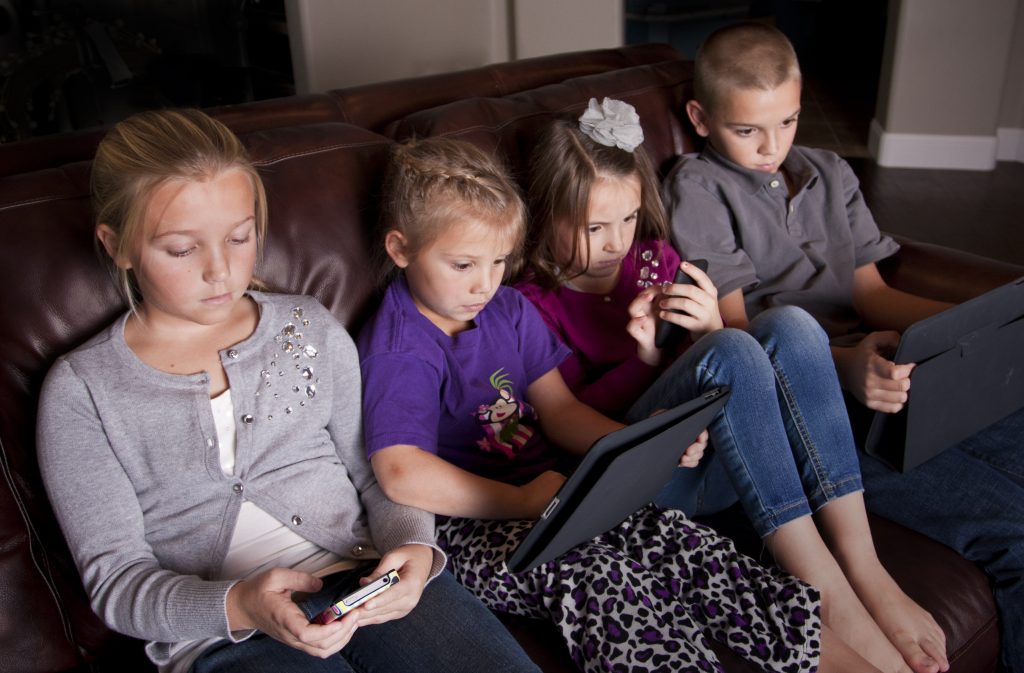“Which of you, if your son asks for a fish, will give him a snake?”
Jesus famously asked his listeners this question (Luke 11:11), and asks us still today, when explaining the full breadth and depth of God’s providential care for his children. In helping us understand the importance of prayer, he appeals to the universal urge in humans to protect and nurture their young. Certainly, if that urge wasn’t built into us, the human race would have long since been extinguished.
Every time I see a little hand holding a smartphone and childish eyes staring mesmerized at the screen, I remember those Gospel words and imagine the phone is a rattlesnake.
The fact is we’ve collectively handed our children and adolescents smartphones — and done so at the most crucial phase of their moral, spiritual, and personal development. Just as they are emerging from the cocoon of the family and trying to apply the good things learned there in a troubled world, we’ve handed them over to tech companies and platforms that care for nothing but columns on spreadsheets.
The experiment has gone on long enough, and the results are in: depression, loneliness, anxiety, suicidal ideation have all skyrocketed among adolescents in developed countries. So has sexual confusion and gender dysphoria, with almost 40% of 18-24 year-olds describing themselves as nonheterosexuals.
Make your way through the “stories” of young people on Instagram, or spend a little time on TikTok, and these sad numbers begin to make sense.
Young people live public, heavily curated lives on Instagram, documenting every moment in a way calculated to arouse admiration and envy — or just arouse. The herd mentality on that app — in which deviating from whatever is “in” at the moment seems unthinkable — breeds superficiality, envy, negative body image, and loneliness in a way that is hard to fathom for adults raised in simpler times, in which adolescence was already fraught with difficulties. The online connections substitute for and crowd out real relationships — the kind that once helped teens weather the emotional storms that are an inevitable part of growing up.
TikTok is by most accounts even worse. By intent and design, the video platform serves up increasingly gross content to children and teens who initially go there to watch innocuous dance videos. Investigative journalists from The Wall Street Journal, using accounts of fake children, documented how TikTok lured them into “rabbit holes” of coarse sexuality and drug use, sometimes within just a few clicks.
Another Journal investigation showed how the app “inundates teens with eating disorder videos.” And traffickers love TikTok for the ready access it gives them. Those worried about the rapid rise of gender dysphoria in teen and preteen girls should look no further than the effects of this app, which glamorizes and grooms girls into thinking radical hormonal and surgical alterations will solve their angst.
Putting aside specific platforms and apps, think of all the things children and adolescents aren’t doing when they are staring into their phones: playing games, reading books, exploring the woods, riding their bikes to Dairy Queen on a hot summer day, giggling with a friend, having one of those deep conversations that changes their lives for the better.
They could be falling in love with someone’s beautiful personality, or their sense of humor, long before they know what she looks like in a swimsuit. Economists call this “opportunity cost.” And what a cost.
I don’t preach from an impregnable position. I’ve been guilty of going with the flow with my five children. It’s hard not to. But parents can ask state governments for help, as there is much they can still do to protect American children and teens from the worst excesses of big tech.
For instance, state legislatures could pass laws requiring sites that host pornographic content to adopt age verification measures to keep those who are under 18 off their platform. Age verification should also be required to keep children under 13 from creating social media accounts (a law that currently goes unenforced).
Another idea: pass laws requiring platforms to give parents full access and control of their minor children’s accounts. Sunlight is the best disinfectant. Another, my personal favorite: states could pass laws requiring social media companies to turn off access to minors during bedtime hours. Eight hours of sleep would help lots of teens weather the emotional storms of high school.
The urge to protect is strong in all parents, as Jesus intuited. But tech companies aren’t caring parents. They are actively handing our children snakes or scorpions, and happily watching their bottom lines and valuations grow. There is absolutely no reason to continue to trust them with our children, and we should all be supportive of any initiative that breaks the tech companies iron hold on them.

